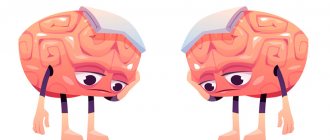One of the most complex and controversial psychiatric diseases of our time is schizophrenia.
Its symptoms are so diverse that only a highly qualified psychiatrist can diagnose the disease. The prerequisites for the disease can appear suddenly and unexpectedly. Therefore, it is necessary to be aware of such a mental disorder and its symptoms. This will allow you to recognize the disease in time and seek help in advance.
General concept
Schizophrenia is a polymorphic disorder characterized by a gradual breakdown of thought processes and emotional reactions. It is one of the most common mental pathologies in modern society, which is progressive in nature. The patient loses normal mental functions: the process of healthy thinking is disrupted, which is accompanied by a gradual decrease in psychological activity.
The systematic development of mental pathology leads to volitional exhaustion, which ends in permanent disability. A schizophrenic is unable to continue active life while in a previously familiar society. Therefore, it is extremely important to detect the problem at the stage of its debut and carry out appropriate therapy that will help stop the disease, minimize its symptoms, and return a healthy, completely adequate person to society.
Working with stereotypes
According to VTsIOM surveys, 70% of Russians have only a general understanding of schizophrenia and only 20% understand how it manifests itself. At the same time, almost 40% of respondents believe that a schizophrenic should be isolated from society. There is also the opposite problem. The patients themselves deny their illness to the last moment, because they are afraid of public condemnation.
The presented results are largely due to a lack of understanding of the essence of the problem. Some people believe that schizophrenics are aggressive and dangerous to society. Others believe that such patients have a split personality and are therefore unpredictable. The first statement is true only to a small extent. Firstly, a patient with schizophrenia can indeed show aggression, but this is rare and often it is directed at himself.
Secondly, usually a schizophrenic, if he commits an illegal act, is in a state of intoxication or in search of a drug dose. Alcoholism and drug addiction in such cases become a consequence of asocialization, which may be partly caused by existing stereotypes about schizophrenia.
As for split personality, it is a different disease - dissociative identity disorder, which has practically nothing in common with schizophrenia. When a person has a split personality, several characters live in one body, each of whom has their own gender, age, habits, beliefs, etc. Such patients often commit crimes, but the disease itself is extremely rare.
With schizophrenia, a person retains one personality, even if he considers himself Napoleon. Pathology causes damage to thinking, as a result of which the patient incorrectly perceives the world and himself in it. In severe cases, he simply withdraws and remains in his fantasies.
Types of mental deviation, their features
The schizophrenic process in women can occur in different forms: simple, resistant, paranoid, catatonic, and less commonly, hebephrenic. Each of them has its own characteristics, depending on which the following types are distinguished:
- continuously flowing. Attacks occur regularly and are characterized by varying duration and severity;
- episodic (paroxysmal). This form differs in that the patient may acutely feel only one or several attacks throughout the entire period of the disease. A timely response and regular monitoring by the patient of her condition preserves the effect after therapy for the longest possible time;
- unfavorable. Its peculiarity lies in the high speed of the progressive schizophrenic process. The final mental disorder can occur in the shortest possible period of time;
- sluggish. It is one of the most common forms of mental deviation among the fairer sex, which needs a more detailed description.
Sluggish schizophrenia
One of the most pronounced symptoms of this type of endogenous disease is the woman’s unusual behavior. In this case, one or more additional symptoms may be observed:
- delusional states, which are characterized by a distorted perception of reality - the patient becomes obsessed with persecutors, insists on her “superpowers” or the presence of an incurable disease;
- hallucinations. This is a manifestation of the disease in the form of non-existent voices that only a schizophrenic hears, as well as visions and smells;
- A frequent symptom is a tendency to philosophize. “Inside out” logic in such a patient is capable of creating the most incredible causal and hereditary relationships that have nothing to do with reality. In everything that happens, she begins to see omens, signs or symbols of approaching inevitability;
- loss of self-control. A schizophrenic woman is fully confident that in difficult or unforeseen situations she is unable to control her emotions, movements, speech, and someone does this for her (an otherworldly force, an ill-wisher, a relative);
- increased irritability is activated. Aggression manifests itself in the form of obvious hostility and asociality;
- the person loses interest in everything she previously did, becomes emotionless and withdrawn, and may not go outside for days;
- chronic depression, which is based on the inability to receive emotional pleasure;
- phobias and obsession. Suddenly you feel fear for your life, the life of your children or close relatives.
Ignoring the first signs of female schizophrenia provokes their further development and worsening. As a result, the patient experiences a total flattening of personality: mental sensitivity disappears, the level of social development decreases to primitive.
Taking medications
The problem for many patients is that they abandon drug therapy. Approximately 50% of patients stop taking pills immediately after discharge from the hospital. Another 25% join them within 2-3 years. This is due, first of all, to a temporary improvement in health. The person feels better and therefore no longer considers himself sick.
Some schizophrenics refuse medications due to substance abuse. In any case, for alcoholism and drug addiction, antipsychotic drugs have practically no effect. Their reception becomes meaningless.
Refusal of drug therapy leads to a phenomenon called resistance - resistance to certain drugs. This increases the risk of developing a new exacerbation. With so-called resistant schizophrenia, the patient experiences both positive and negative symptoms. The pills hardly help, and the condition is getting worse. Psychosis can begin at any moment.
Resistance to drugs in schizophrenia is observed in almost a third of patients.
The patient's relatives should motivate the person to take medications. Their task is not just to constantly remind him about the pills, but to explain why it is important. If he follows the doctor's recommendations, do not skimp on supportive words. They are also important for healthy people during periods of difficulties and undertakings. A schizophrenic needs support even more, even if he doesn’t talk about it or show it.
General symptoms
An endogenous disease such as schizophrenia does not occur suddenly. As a rule, its obvious manifestation is preceded by months, or even years, when the symptoms were practically invisible to others. During this period, a woman gradually withdraws from society, breaks off previous social ties, and withdraws into herself.
A gradual change may not be noticed in a timely manner even by the closest people, which contributes to the worsening of the condition until the moment when obvious signs of mental disorder begin to appear. During the onset of the disease, people around you often mistake such hidden manifestations for depression or an affective disorder.
The main symptoms and signs of female schizophrenia are:
- feeling of isolation, inability to take initiative, gradual decrease in mental activity;
- abnormal perceptions of what is happening;
- deviating statements, conclusions and judgments;
- speech disorders that arise as a result of mental flattening;
- limited emotional expressions;
- low volitional and motivational activity;
- worsening memory and performance functions;
- behavior that is incomprehensible to other people;
- violations in the field of movement coordination and control systems.
The onset of schizophrenia is accompanied by persistent feelings of tension, depression or depression. A woman experiences a sudden lack of attention and fatigue, which provokes a feeling of physical and psychological overload.
A schizophrenic does not come out of a pessimistic state for a long time, which gets worse over time. Paranoid factors begin to actively influence his perception of the world: he begins to feel that something extremely important is happening around him, but cannot understand what exactly. Demanding an explanation from others, a woman thus turns on the protective function of the body: “Pay attention to me,” “Tell me what’s wrong with me.”
The patient gradually breaks the connection between herself and the previous, threatening, in her opinion, reality, and creates for herself a new variation of it. In a new, painful perception for her, everything around her takes on an enemy form: people who wish her harm, events that are specially arranged, not real, created artificially in order to lull her vigilance.
An ordinary trip around the city, organized by a husband or friend, can be perceived as a theatrical act to distract her from something more significant. The media turn into primary enemies, which, exerting a hypnotic influence on her, deliberately mislead her.
The life of a schizophrenic turns into constant waiting and following higher signs. This especially applies to women with a family: they begin to devote their lives to constant monitoring of relatives and loved ones (children, husband), sincerely believing that they are protecting them and themselves from negative influence from the outside.
Insomnia – a symptom or a temporary physiological feature?
In some cases, sleep disturbance actually occurs due to nervous exhaustion and prolonged overexertion. However, if insomnia is accompanied by at least one of the above-mentioned signs of the schizophrenic process (constant tension, mistrust, excessive suspiciousness), this is a reason to seek advice from a specialist.
The patient feels constant anxiety and fears, which gradually transform into phobias. As a result of this, sleep and wakefulness are disrupted: the person, being in a state of constant fear and inability to give a correct assessment of what is happening, begins to be afraid to sleep. A ban on proper rest is formed in the subconscious, and the schizotypal personality gradually brings himself into a state of physical exhaustion, which only aggravates the general condition.
Colored dreams: what do they indicate?
According to one theory, the colored dreams that a representative of the weaker half of humanity can see are a clear sign of the beginning of the development of the schizophrenic process. However, experts in the field of psychiatry consider this to be a misconception. Such dreams only indicate a person’s subtle perception of the surrounding reality. Women are more capable of empathetic sensitivity than men. This explains their increased vulnerability and susceptibility.
Thus, it is incorrect to talk about a direct connection between color dreams and schizophrenia. But increased sensitivity in women in the case of a negative atmosphere in the family can become a trigger for the onset of the development of a mental disorder.
How to communicate
One of the symptoms of schizophrenia is the desire for loneliness. Withdrawal becomes especially pronounced after psychosis or immediately before its development. For this reason, leaving the patient alone for a long time is not recommended. It is advisable to talk to him more. Conversations on abstract or interesting topics for the patient will prevent him from immersing himself in his inner world.
We can formulate several basic rules for communicating with a schizophrenic:
- Speak more slowly. Remember that the person may have impaired cognitive function. Perhaps he absorbs information worse. But at the same time, you should not treat him like a child, explaining everything in too much detail. He should not sense a patronizing or didactic tone in your voice.
- Don't criticize. Communicating without arguments is difficult even for healthy people. Often close friends quarrel over different religious or political beliefs. You should not get into verbal altercations with a schizophrenic. Also try not to criticize his judgments, even if they seem absurd to you.
- Don't raise your voice. Screaming and swearing cannot contribute to normal communication. The conversation should be productive. It is impossible for the patient to withdraw into himself after the conversation and begin to replay the quarrel in his head ad infinitum.
- Don't forget about the patient. Never talk in front of a patient as if he were not there. In most cases, he understands everything perfectly, since he is conscious. If you need to talk to someone about a patient, do it in their absence.
- Do not increase the patient's delirium. He may feel like he is being followed. Don't text other people in his presence. Don't laugh at megalomaniac delusions. Develop a behavior plan in case the patient has a panic attack. Let's say he believes that the intelligence services are watching him. Don't try to convince him of this. He will stop trusting you. Better listen and try to understand how to help him.
It is necessary to separate the person and his disease. He probably will not tolerate a condescending attitude. He also won't like being treated like a child. In a state of remission, a schizophrenic is often no different from ordinary people. He can work and even raise children.
Schizophrenia does not prevent some people from getting married, working, and getting doctorates.
An unusual attitude towards a patient will emphasize the “unusuality” of the patient himself. This will interfere with socialization. If you remind him in one way or another that he is sick and he can’t do something, he will never be able to feel like a full-fledged member of society.
Causes of the disease
Schizophrenia begins to develop as a result of a disturbance in the exchange of neurotransmitters - signaling molecules that ensure interaction between brain cells.
Despite the fact that the disease can be inherited, it is not always associated with this factor. Of all the reasons that can act as a trigger for the onset of the development of an endogenous disease of a schizophrenic nature in women, the most active can be identified:
- unfavorable intrauterine development or hereditary aspects. Genetic mutations can occur spontaneously - during pregnancy or after the birth of a child. They can remain in a “sleeping” state for a long time. Genetic predisposition is also important, when one of the blood relatives had a similar disease;
- violations of the educational process. Permissiveness and promiscuity of a teenage girl due to the ambiguity of the parent/parents can lead to severe mental disorders. And also, according to medical statistics, cases of schizophrenia, which occurs as a result of insufficient maternal attention to the child during the formation of his psyche, have become more frequent;
- shock and stress factors. In most cases, they are the trigger mechanism for those mental processes that occurred sluggishly in a woman’s body and did not manifest themselves for a long period;
- age crises. The first of these occurs when a girl leaves parental care and begins to form her own separate, independent life. In the future, due to the characteristics of the female body, she experiences many additional stress factors - hormonal teenage changes, pregnancy, childbirth, postpartum psychosis, menopause. Especially often, signs of schizophrenia are observed in those individuals who are in the involution phase - the disappearance of menstrual function, a sharp decrease in hormone production. A qualified specialist will always be able to distinguish a psychoaffective disorder associated with age-related changes from a pathology of a schizophrenic nature;
- regular intoxication with alcohol and drugs.
One interesting case is described in the medical literature when a schizophrenic woman herself turned to a psychotherapist for help. After the birth of her child, a 27-year-old woman began to feel extremely uncomfortable: she began to feel as if her baby’s life was in danger, but she could not specifically explain what exactly was bothering her. Not finding support in her family, she turned to magic: having read on the Internet about different ways and methods to protect a child, she tried to put them into practice.
The husband did not pay attention to this in a timely manner, mistaking the young mother’s inappropriate behavior for postpartum psychosis. But gradually the situation worsened: the woman began to devote a lot of time to “cleansing karma,” so the child often remained hungry and unkempt. In response to all the husband’s comments, the wife replied that she was doing a more important thing - she was saving their family.
The woman completely refused to communicate with her parents, because in her visions they are the ones who bring trouble by trying to harm their grandson. At moments she had an epiphany: she told her husband that she did not understand what was happening to her, and asked for help. Not receiving support, she returned to her previous occult activities. Only now her phobia has worsened: she has already “saved” not only the child, but also her husband, who, she is convinced, has a mistress. Gradually, the woman cut off all her previous contacts and connections, believing that all her friends were traitors and were secretly laughing at her.
The young mother became extremely suspicious and antisocial: she did not go outside for days. In response to her husband’s remark that the child needed to go for a walk, she made up non-existent myths about a new viral disease. Gradually, she stopped taking care of her appearance, became unkempt, and considered all hygiene procedures to be just a formality. Intimate relationships between the spouses completely ceased.
After the next ritual, the woman forgot to blow out the candles and fell asleep. As a result of the fire, which was quickly extinguished, her baby ended up in the hospital. Realizing that she was the one who harmed him, she went to see a psychiatrist.
After establishing a diagnosis of episodic paranoid schizophrenia, the doctor prescribed appropriate therapy. To begin with, he had a conversation with the patient’s husband, to whom he explained all the features of his wife’s illness, and the rules of behavior with her. Due to the lack of need for hospital treatment, the patient was prescribed special medications. Their dosage, depending on the patient’s condition, was regularly administered by the attending physician.
As a result of the persistent joint work of the specialist, the patient and her immediate environment, the patient began to feel much better after 4 months and fully realized the error of her phobia. Now this made her perplexed: “Did all this really happen to me?” The husband became more attentive to his wife and began to devote more time to her and the child. She periodically visits a psychotherapist in order to prevent a recurrence of the disease.
How to behave with a sick person
First of all, it should be understood that a doctor must treat schizophrenia. The task of the immediate environment is to help the patient rehabilitate.
Typically, relatives are invited to family psychotherapy, during which they learn the rules of communication with a schizophrenic. In the future they will have to be observed. This does not mean that living with such a person is dangerous or very difficult. But the peculiarities of his behavior will have to be taken into account.
How to convey information to loved ones
Firstly, close relatives need to accept the diagnosis, but should not be ashamed of it. Usually this is noted quickly in communication, including by the patient himself, and he should not feel like a “leper” and “unnecessary”. Try to convey objective information about schizophrenia to all family members and friends. If there are small children in the house, explain to them that they should not laugh at “uncle” if he behaves strangely or, for example, often forgets something.
Medical terms will not help in this case. A psychiatrist will help you find the right words during family psychotherapy. Both the patient and his relatives will have to attend the sessions. It is better to do this together so that the patient everywhere feels the support of people who care about him.
Home improvement
After a person is diagnosed with schizophrenia, they will have to rearrange their life a little. First of all, you need to explain to the patient what it is not necessary or even desirable for him to do, for example, turn on the gas or repair the electrical wiring. In the first weeks or months, do not leave him alone and do not let him go outside without an accompanying person. It is unknown who he will meet and how the conversation will go. It is better to keep him busy while walking with a conversation.
A person with schizophrenia may neglect hygiene. At first, you will have to remind him of the need to brush his teeth, shave and take a shower. It is worth considering that this pathology often develops at a young age and often in adolescents. They are not only schizophrenics, but also children, so the usual upbringing continues, but with a number of features described earlier.
In your absence, the patient may leave the apartment without permission. Place notes with phone numbers and addresses in his clothing pockets in case he gets lost. Schizophrenics have problems with short-term memory, so they can simply get lost.
TV viewing will have to be limited. You should not watch horror or thriller films. At the same time, you will have to give them up too. If you forbid them to the patient, but do not limit yourself, he will feel superfluous or defective. It is advisable to give preference to calm programs and films about nature, sports or art.
Alcohol will have to be eliminated from your life. Schizophrenics have a tendency to use psychoactive substances, so it is better not to provoke it and give up alcohol and bad habits yourself. If you serve as a good example for the patient, it will be easier for him to cope with his illness.
Diagnosis and treatment
Diagnosis of schizophrenia involves many procedures, the main ones being EEG, MRI, CT and psychological tests. With their help, it is possible to exclude organic brain damage and other types of mental disorders.
Determining the form of schizophrenia is much more difficult. The signs of its hebephrenic variety are quite transparent, and sluggish or latent depression is not much different from ordinary depression. Sometimes diagnosis takes months.
Psychopathology is treated with antipsychotic medications and psychotherapy. The first ones are necessary both during an attack and during remission. Psychotherapeutic techniques are indicated not only for patients, but also for their relatives, who need to learn how to properly communicate with a schizophrenic.
Conventionally, a person’s life can be divided into the time before diagnosis and the period after it, but a clear boundary can be traced extremely rarely. Most patients go into long-term remission and do not even need disability or social benefits in the form of benefits. Much depends on the patient himself. If he takes good care of his mental and physical health, he can live a happy life.
Facial expressions
It’s worth mentioning right away that it’s difficult even for a psychiatrist to identify or recognize a schizophrenic by facial expressions, so it’s better not to draw any conclusions based on the characteristics of a person’s smile, etc. However, some patterns can still be traced. Thus, in patients with schizophrenia, facial expressions of interest, attention and pleasure are less common. They also do not smile as often as mentally healthy people.
There are even several smile variations that scientists have identified in patients. There are four in total:
- Smile with detachment. When the patient smiles, he turns away his gaze. This is due to the reluctance to make strong contacts.
- Proboscis smile. Trying to smile, the patient extends his lips forward, as if he had a trunk. Scientists suggest that this is due to damage to the corticonuclear pathway (from the cortex to the nuclei of the cranial centers).
- A forced smile. Facial expression is in dissonance with true emotions. In essence, this is just an imitation of a smile, which healthy people also resort to. In schizophrenics it occurs more often and, most likely, is of a compensatory nature.
- Dissociated smile. It is determined by a violation of the consolidation of facial expressions, when the movement of the lips is noticeable only on one side, like in a paralytic. But then the smile disappears and appears on the other half of the face, which distinguishes it from manifestations of the neurological type.
Researchers also study the eye contact that patients make with other people and things. In most cases, schizophrenics avoid direct gaze, like to look from under their brows, or simply turn away from the interlocutor.
Gestures in schizophrenia
The third group of studies, which is worth highlighting in the article, is not related to the eyes, but also concerns the diagnosis of schizophrenia by external parameters, that is, by the patient’s gestures. It turned out that in the presence of delusional disorders there are more gestures of withdrawal, disgust, anxiety and demonstration. This is called aggressive-preventive behavior.
Depressive and paranoid positive symptoms are accompanied by gestures of reversal, anxiety, brooding, completion and clapping. With negative symptoms and catatonia, the patient often makes gestures indicating embarrassment and submission.
As a result, scientists created a classification of syndromes based on gestures:
- affective (agonistic behavior);
- productive (gestures of empathy);
- negative (escape from contact).
Also in the diagnosis, observations of specific parts of the body can be made. Thus, nodding and throwing back the head in healthy people and schizophrenics are observed with the same frequency, but are almost not detected in patients with deficiency and catatonic syndromes. They are also more likely to have shoulder reactions when talking to a doctor. With paranoid symptoms, they go up, especially during a conversation with men about the causes of the pathology, which many patients try to hide.
With affective syndromes, the shoulders tremble, but under the influence of a strong sound or a change in body position by a psychiatrist. With catatonia, this is observed even when exposed to minor stimuli - the rustling of paper, raising a hand, etc.
Research is not limited to observing eyes and body position. Facial expressions, the ability to be surprised and other aspects are also studied.
The motor skills of grooming are quite interesting - shaking off dirt, tidying up clothes and hair, etc. With depressive and hypochondriacal symptoms, allogrooming is detected, when they clean themselves directly, and mutual grooming (cleaning a neighbor). In all cases, the movements are stereotypical, that is, the same, which do not depend on external factors.
The first signs of exacerbation
Another important task for the patient’s immediate circle is to identify the signs of incipient psychosis in a timely manner. The sooner you can contact a psychotherapist, the faster he will eliminate the symptoms of the disease, therefore, the smaller the residual schizophrenic defect will be.
There are many symptoms of schizophrenia, but it is worth paying attention to the most obvious:
- The man became overly suspicious. In such cases, he sharply reduces contacts with his family and withdraws. Whatever you say or do, he will evaluate and comprehend. Perhaps he will begin to ask something often. In general, any changes for the worse should be alarming.
- The patient talks to himself. If he still often looks around and looks around, then there is a high probability that he is developing delusions and auditory hallucinations.
- The patient develops unreasonable fears. He begins to be afraid of ordinary things, for example, the dark, the sound of a washing machine, or the number “8”. Because of these phobias, compulsions develop - stereotypical movements and rituals. For example, a patient may walk around a chair three times before sitting on it.
- Speech disorders are observed. The patient either cannot formulate his thoughts, or does it strangely, inserting incomprehensible and even fictitious words into his reasoning. Pseudo-philosophizing, drawing banal conclusions, etc. are possible.
- Negative symptoms intensify. The person becomes lazy, indecisive and uninterested. He doesn't do anything until he's reminded. Problems arise with decision making.
There may be other symptoms characteristic of the form of schizophrenia that your relative has. You'll have to study the theory a little. Your doctor will help you with this.










